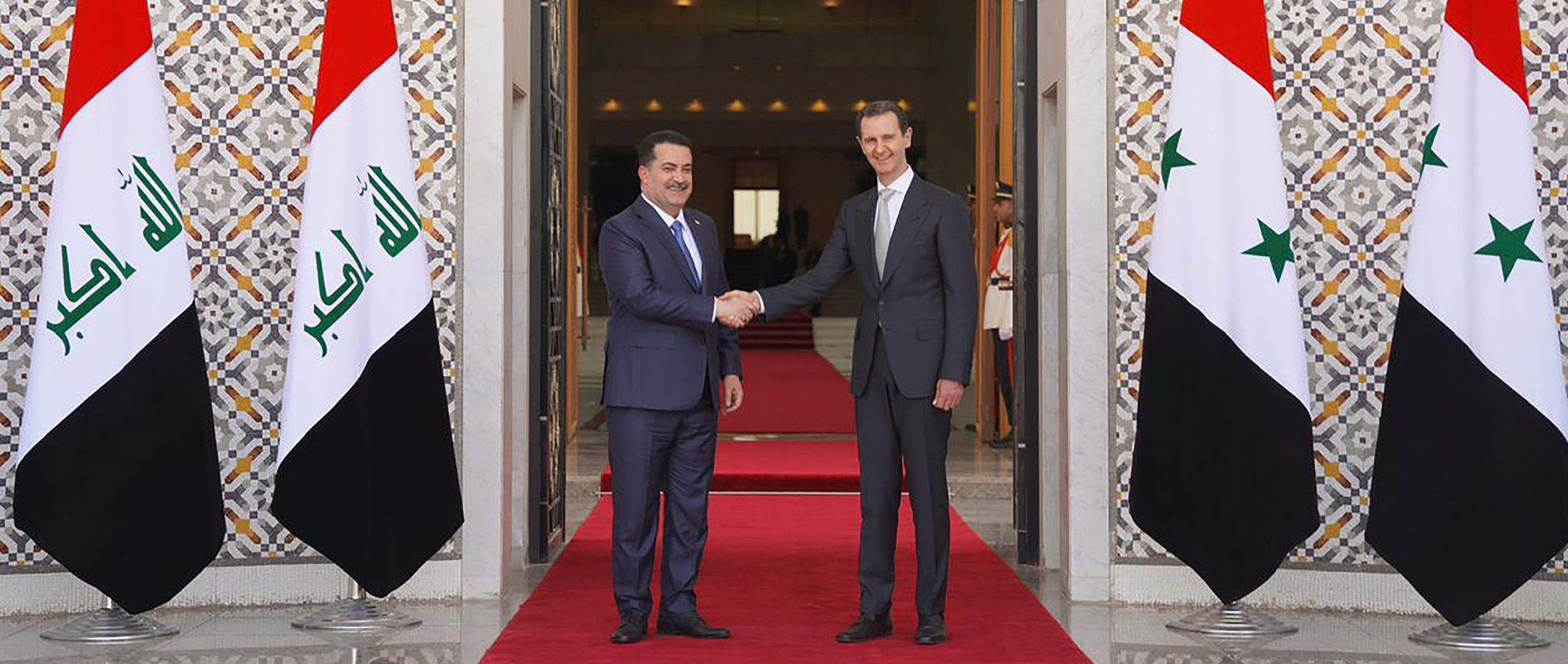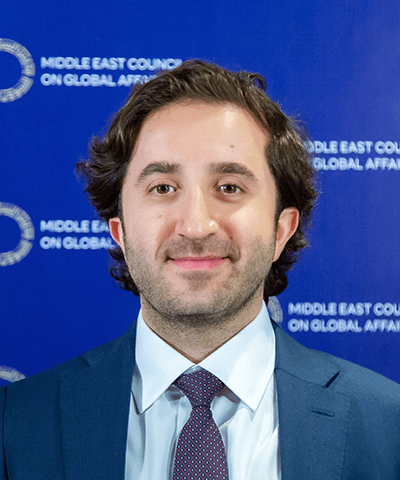The visit of Iraq’s prime minister to Damascus in July was the latest sign that Syria is mending ties with its neighbourhood, more than a decade after the Arab League suspended its membership over its brutal repression of anti-government protests. As the country’s catastrophic civil war settles, the regime of Bashar al-Assad can chalk up Mohammed Shia al-Sudani’s visit, at the head of a large Iraqi delegation, as another success in its campaign for acceptance on the world stage, just two months after the Arab League welcomed it back.
Assad has been a global outcast throughout the war, which has claimed the lives of hundreds of thousands of people, displaced millions, and left the country in physical and economic ruin even before a huge earthquake hit in February. Some observers see the restoration of ties with Damascus as a blow to the hopes of holding the regime accountable for its crimes against humanity. But Syria’s reintegration is far from complete, and even the steps already taken could be jeopardized by the regime’s many prickly issues with its neighbors.
Interest-Based Normalization
Several Arab countries have led the push for normalization with Syria, believing it serves their interests to engage, rather than sideline, Damascus. The United Arab Emirates, Saudi Arabia, Oman, Jordan and Iraq all have important strategic and national security interests that require dealing with Assad, not least the illicit trade in the drug Captagon and the question of Syrian refugees.
The renewed outreach to the regime has to some extent been precipitated by a hands-off approach from Western governments, pre-occupied by the war in Ukraine and increasingly focused on Asia and the Indo-Pacific. That has left room for regional states to take the lead in shaping their policy responses to Assad’s victory and the post-war contest for influence, which also implicates Iran and Russia. Countries such as Saudi Arabia and the UAE cannot afford to sit this out or to depend on Washington’s next move. Moreover, the region is rapidly changing, with a major shift toward tactical de-escalation, as highlighted by the Saudi-Iran rapprochement earlier this year.
The Gulf states and Jordan have a particular concern regarding Syria. The regional trade in Captagon, a highly-addictive amphetamine-type drug now common across the region, was estimated to be worth well over $3.4 billion in 2020; the next year it grew to some $5.7 billion. The actual numbers are likely to be much higher. Much of the product originates in Syria, and senior regime officials and regime-aligned profiteers are reported to be involved in the industry, which supplies drugs to neighboring countries including the Gulf states, Jordan and Iraq. In September, Saudi Arabia seized nearly 47 million Captagon pills at a warehouse in Riyadh. Millions more have been intercepted since.
The trade is one of a number of concerns that has given regional countries little choice but to engage with Damascus. Jordan and Iraq cannot allow Syria’s south to continue as a safe haven for the rapidly expanding drug-trade, or risk an epidemic. But while the Gulf countries are dealing with the regime, obtaining guarantees that Syria will end the trade or address the traffickers is highly unlikley. The trade is essential to the economic survival of the regime, and ending it would clash with the interests of powerful actors on whom the regime depends for its political survival. The regime is also likely to use the cross-border drug trade as leverage to garner as many concessions from regional actors as possible: if rapprochement fails to secure the regime the funds it needs, the trade will continue and expand uninterrupted. On this basis, it is highly plausible that the regime has no plans to actually negotiate in good faith, given the importance of this illicit industry to its political survival.
Another key issue between Damascus and regional powers is the large population of refugees living in the states bordering Syria. Türkiye alone is home to over three million Syrians, and opposition to their presence was a hot issue in May elections. Türkiye also has other major interests inside Syria. On top of at least $40 billion the government says it spent on Syrian refugees between 2011-2019, Türkiye’s occupation of northern Syria costs a further $2 billion annually. These issues and Türkiye’s other pre-occupations could push Ankara to also seek normalization with Damascus in order to reduce the burdens they pose.
Yet Damascus is deeply opposed to Türkiye’s presence in northern Syria, which is now firmly entrenched. Turkish institutions—businesses, charities and security—have deep roots from the Latakia countryside in the West to Kobani in the East. It is difficult to envisage a scenario in which Türkiye would be willing to uproot its entire infrastructure. It is also inconceivable that Türkiye would entertain the idea of the full restoration of the regime in the regional and international order if this either maintains the status-quo in the northeast or empowers the Kurdish Workers’ Party (PKK), which Ankara deems a terrorist organization.
Aside from the Kurdish northeast enclave, Idlib will likely be a major flashpoint moving forward: Türkiye has become the enclave’s main protector. President Recep Tayyip Erdogan, now comfortably heading into another five-year mandate, may see normalization as a chance to repair relations with the Assad regime and find ways of reducing Türkiye’s footprint. However, once again, Ankara is unlikely to receive any credible guarantees that the regime will not launch an onslaught against civilian populations in the future, which would have direct cross-border consequences for the Turkish state.
Türkiye is but one example of how the very issues pushing regional powers toward engagement with the regime in Damascus still pose major stumbling blocks to the whole process of reintegration.
Restoration could empower Iran and Russia
Restoring Assad’s legitimacy could empower the foreign actors who have emerged victorious from the war—particularly Iran, which will be expecting to build on these gains by becoming the preeminent outside actor in Syria. Both Iran and Russia will see normalization as a vindication of their own involvement in the war and an affirmation of their victory. Iran sees Assad’s normalization as a key opportunity to consolidate its gains and begin to formally integrate and entrench some of its proxies into the Syrian state, as Tehran has also done in Iraq, where, most recently, it drew on the war on Islamic State (ISIS) as an opportunity to accelerate the ascension of its proxies. This would run directly against Arab wishes that it de-mobilize its proxies as part of a broader regional de-escalation. It also has potentially violent consequences domestically, since there are no guarantees that the regime will tolerate the political and military entrenchment of Iran-aligned groups.
In fact, Syria’s deeply fragmented territory is part of a broader challenge in dealing with the country. Assad currently has control over regime-held territories in the east, but Syria is divided into zones of influence largely controlled by external actors. Idlib is under the influence of Türkiye and Russia; the northeast Kurdish enclave is under the influence of the United States; and in the south, Iranian proxies control territories close to the armistice line with the Golan Heights, which could result in a conflagration as the long-term entrenchment of these groups is not acceptable to Israel.
It is also conceivable that the Syrian insurgency, currently fatigued and in disarray, could be rekindled. Syrian Kurds, who are a formidable force both militarily and politically, also have spoiler capacity. Their allies in the West may look to maintain the autonomy of their enclave in the northeast, in order to keep some leverage over Assad.
Assad may project the aura of control and authority, and use the symbolism of regional rapprochement to augment the regime’s position domestically in the face of potential challenges and contestations from a patchwork of non-state actors—militias and warlords, tribes and armed groups that answer to foreign powers. However, these groups will retain their influence in post-war Syria, will likely dominate the political economy of the country, and will have no shortage of arms and resources. This is where Western governments will continue to have a decisive say over the future of the country and regime.
Syria needs $250 billion to rebuild, which will not be provided by the Gulf states alone. But Western countries will not play a role in rehabilitating the regime, and have so far categorically argued that rehabilitation is conditional on a political transition and a settlement to the conflict. Assad is unlikely to regain control over the northeast, for example, for as long as Kurdish groups remain a vital part of the U.S. counter-terrorism mission to eradicate ISIS. There has so far been little to suggest the U.S. will wind down its presence anytime soon. Indeed, the U.S. has responded to the latest normalization moves by asserting that recognition of the regime and reconstruction will not take place until the implementation of United Nations Security Council Resolution 2254, which calls for a Syrian-led process leading to a new constitution and free and fair elections, a position backed by the European Union.
Therefore, while the regime may feel a sense of empowerment and see recent overtures and its presence at the Arab League Summit in Riyadh as a restoration of its regional legitimacy, it remains highly implausible that it will re-assert its authority over the whole country any time soon. As long as this remains the case, both regional powers and the West have some leverage that could be used to push the regime towards a political transition and to prevent attacks on civilians.
The opinions expressed in this article are those of the author and do not necessarily reflect the views of the Middle East Council on Global Affairs.

